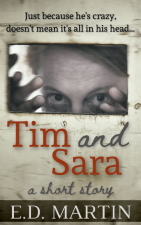I used to teach English, and I read all the time, so I have a big vocabulary. I don’t dumb down what I say to my preschool-aged son, and neither does his father. The kid watches a lot of PBS, especially Martha Speaks, which is a show about a talking dog who wants to know the definition of everything.
As a result of being around so many big words be has a pretty impressive vocabulary for someone his age.
Last night at dinner, he asked, “Do you know what cinnamons are?”
“Cinnamon is a kind of spice,” said his father, “used for cooking.”
“No, cinnamons.”
“It’s a spice,” his father repeated.
“No, cinnamons,” he insisted. “It’s two words that mean the same thing. Like happy and glad.”
“Oh, synonyms.”
“Yeah. Cinnamons.”
Last week I took a couple of my students to a banquet hosted by a local science and engineering community, and something one of the speakers said really stuck with me:
We read to our kids, and encourage them to read as well. But what are we as parents doing to encourage their love of math and science?
I’ve been thinking about that, in the context of parenting my son, teaching my students (most of whom hate math), and writing stories, and I think I’ve come up with an answer.
It’s not enough to allow our readers to live vicariously through our characters. We need to make our stories so engaging that when readers finish them, they get up and go have the same experiences themselves: travel to a distant location and explore the location on foot, or plant a garden or make your own clothes like our pioneer ancestors. But most importantly, ask questions, especially “why” and “how.”
What do you do to encourage your kids (either your own or in a classroom) to love math and science?






Hello! I just passed the Liebster Award thingy on to you – check out my last post : )
For science – we do a lot of simple experiments for fun. And my kids love our garden, planting things and watching them grow, bugs, weather.
Math is a bit harder. Two of my kids have a natural interest in math (definitely didn’t get it from me) and the other two…hmmm.. I’d love to hear some hints on that myself.
Not answering your question directly — but something that frustrates me about our current education system is that we are willing to celebrate athletic prowess but don’t want anyone to know about where kids fit academically. There is a board at my daughter’s school with the top runners in each grade, but they aren’t supposed to know if they are in the “top”, “middle”, or “bottom” reading group because that might make someone feel bad. But what if I feel bad because I can’t run fast? Too bad – try harder… :-(
T. Drecker – My son’s dad works in math with grocery shopping – “If we buy 8 bananas and eat 3, how many will we have left?” And cooking is good for math too, with addition and subtraction, as well as simple multiplication – “If we triple the recipe, how many eggs will we need?”
Suzanne – That really sucks that they encourage the sports more than academics. My students find it weird that I love to read while they’d rather be out playing basketball. We came up with this:
You’re your own person. Just as telling me to try harder won’t help me instantly get the ball in the hoop, telling you to try harder won’t help you instantly understand vocabulary. It takes a lot of practice, and it’s okay if you’re never going to be a great athlete or a great reader. However, you still have to get the basics down, which is why everyone learns to read and play basketball. Later in life, you can find your niche and decide what’s the best path for you. Schools just want to expose you to everything.
And a friend of mine added that maybe students haven’t found the right genre that’ll make them like reading, just as I haven’t found the right sport. Again, it all comes down to exposing the kids to as much as possible, so that they can determine what they like best and what they’re best at.
Now, if I could just convince the education world that this is the point of school…. :)